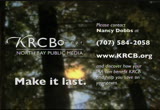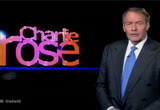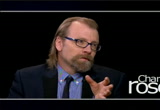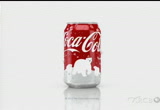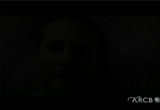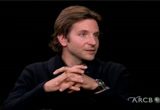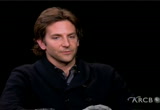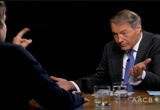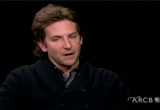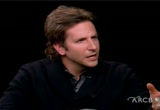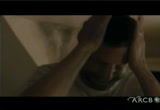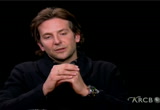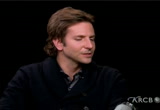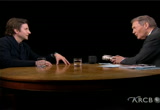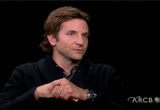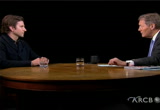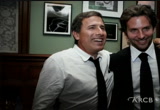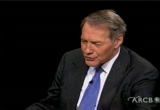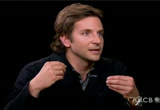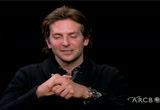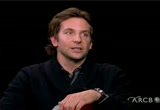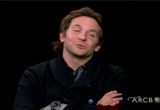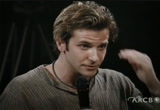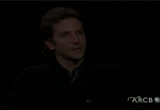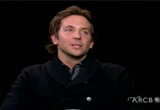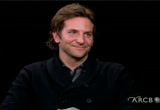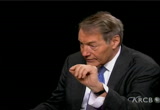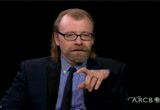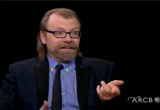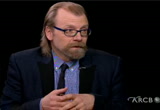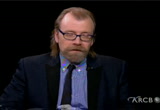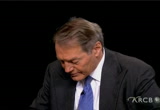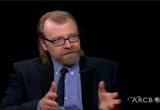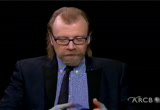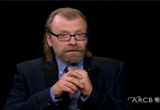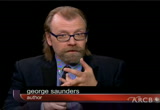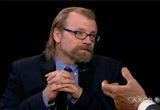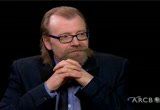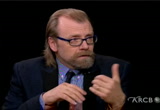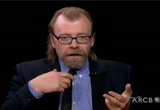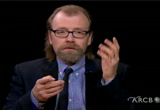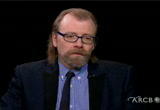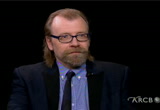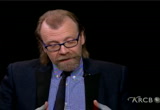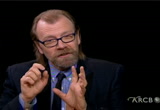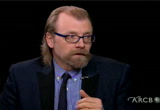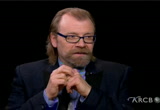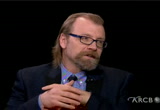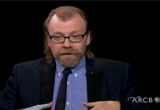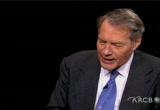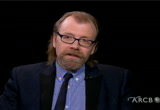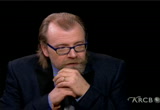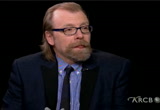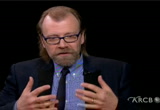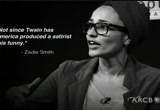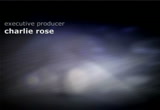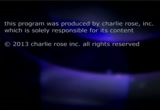tv Charlie Rose PBS January 29, 2013 11:00pm-12:00am PST
11:01 pm
11:02 pm
like in the profound way. in this movie more than any other i really did feel like i got out of the way in the morning and let him come over. and it sounds very sort of acty. i let this guy take over. that's his bottom. we're watching this guy at a bottom. >> rose: one one clude with george saunders his boois called the "tentof december" and this is what the "new york times" said the best book you'll read this year george saunders "tenth of december." >> at certain critical points i was sort of encouraged by my life to go for the harder effect which is often the more luminous effect or the kind of vigor
11:03 pm
effect. it's hard to explain but something about the life seep into the stories. en i got into a critical point where maybe 15 years ago i would prefer the dark sword. now i'm a point i would feel like is there a way to credit some of the positive in my life. >> rose: bradley cooper and george saunders, next.
11:04 pm
captioning sponsored by rose communications from our studios in new york city, this is charlie rose. >> rose: bradley cooper is here, millions know him from his movies or people's magazine sexist man alive but if you play closer attention you've seen his talent as a actor this season in "silver linings playbook" nominated as are for an oscar at best actor. here's a look at his performance. >> the world will break your heart ten ways to sunday that's guaranteed. and i can't begin to explain that. where the craziness inside myself and everybody else but
11:05 pm
guess what. sunday's my favorite day again. i think of everything everyone did for me and i feel like very lucky guy. this is what i learned in the hospital. you have to do everything you can, you have to work your hardest and if you do if you stay positive you have a shot at the silver lining. ros im pleased to have my friend. this is a great moment, a good moment to be because the harder you work because of how you selected things to give you the chasm to do -- chance to do the thing you want and a hangover allows you to have those kind of movies with these kind of movies. >> i couldn't have strategize it better without ever thinking in those terms but you're right. it's incredible, charlie. it's incredible, you know and it is all for the origin of the hangover it really is which allowed relativity to allow me to do limitless because that was successful and david russell and harvey weinstein, you know,
11:06 pm
these when it opened up. >> rose: he's the character you played. how did they come to you and what did they say and how much of a conversation took place before you began to make the movie? >> this was an interesting one because david russell sent me the script during the summer not for any other reason we were having a dialogue in general about another movie that didn't happen. this movie is already cast but i want to know what you think of it. he's someone who is very curious. i find great directors always want everybody's opinion in general which i think is a good thing to do anyway. so i read it, we talked about it and that was it. it's shooting another movie in new york and i got a fall from him and he said you know something happen an actor's fallen out. i want to play -- the character's name was different at the time. i just thought i wealth back and i remember thinking about that script and i thought this is what you dream of. this is what you dream of when you're a kid watching movies and you sethese characters and you
11:07 pm
think that would be just. >> rose: why do you say that. why is this a character you dream of? >> so many reasons. well, how much it's different from me or how much i have to find myself and connections to him. if he was sitting here right god knows what would come out of his mao because he has no filter and had his emotions are right just under the surface. and he's also fascinating because neurologically it's a very unique pathway the way that he processes information and that's what you know causes him to have manic episodes, what we could define as bipolar being manic depressive. >> that's talk about who he is now. he's come out of inside after 18 months or so and he's manic depressive, bipolar. so not just manic. >> yes. he's diagnosed bipolar but you never know. this is a guy who is 35 years old and he did a me bark -- ban
11:08 pm
to go to the institution so he wouldn't serve time. while he was in there the doctors diagnose him as being bipolaand ey want him to start medication and he's got a strategy and he wants none of it, he wants no help. so we're meeting this guy who is in denial about the fact he needs help. he's living at home. he's got no car he's got no cell phone. they won't allow him to visit he's got no of course he's not allowed to get his job back and his wife who he thinks is going to have a savior has a 500 yard restraining order. >> rose: he wants no part of it. >> no. the beautiful part about it is he couldn't be happier. he's in this manic delusion that's going to fall. >> rose: his father is robert deniro who is an amazing ego. >> like my family and many
11:09 pm
philadelphia family. we grew up how much eagles fans and this is a typical reflection of that. actually in fact what i say wasn't his name because we couldn't get the rights to the name that was in the script, for about a week we troid to get -- tried to get my mother's maden name as his name and we thought we were going to visit but that didn't work so solatano sounded like it so we went with that. >> rose: working with deniro is always a joy for you. >> it's ... what can i say. i liken it to, i mean the relation shoop you've had over the years where you sit back and think how did this happen. >> rose: i can imagine being friends with somebody like that. >> yes. but you are, i mean someone you were a fan of in collect or -- college and you start interviewing him and now he's a friend of yours. >> rose: i want to take a
11:10 pm
look at some scenes. this is a movie getting a lot of attention, a lot of buzz preos ter including best actor and david russell as best director. here is a scene in pat has a break down in the attic. >> i'm not calming down. i don't give a [bleep] i'm not calming down. >> stop it. >> let the whole neighborhood wake up, i don't care. >> what's going on. >> hey. >> it's my wedding, it's my wedding. >> rose: as you're watching that you said that's sad. >> yes, it's so sad, yes.
11:11 pm
you know, certain actors i talked to just talked about how they learn things from the characters they played and like kind of in a profound way. in this movie more than any other i really did feel like i kind of got out of the way in the morning, and let him come over. let him, and it sounds very sort of actory but it's sort of how i experienced it charlie, i kind of walked away and let this guy take over, this guy pat. and every time i see him i just feel so much empathy. that's his bottom. we're watching this guy at a bottom. >> rose: but you believe that he got inside of you and that's the reason he was able to do this. >> i don't know what happened, you know. but i know that when i see that, i'm lucky and this guy that i care a lot about, this guy pat all the time. >> rose: you care about it because? >> because maybe i learned about him. he's i mean he's a guy that's just struggling to endure, to maintain and he just has no help.
11:12 pm
i know my life where i haven't asked for help or i try to control everything. it's just not going to work out. this is him realizing not realizing but us watching him not being able to work it out. >> rose: there was a time in your life where you talked to me and others which you were rebellious. >> growing pains or becoming an adult. i made a decisionwhich was terrifying i'm not going to fulfill my potential as a human being. my parents i had such a luxury because of the way it's brought up. my dad worked so hard to give me so many opportunities and i'm sitting there 29 years old and i thought i'm such a jack [bleep] i'm going to squander and change this thing. >> rose: wealth to georgetown and them new york.
11:13 pm
>> yes and then i went to grad school. >> rose: there's a story that jane lipton told your mother or father he's going to do big thing. >> i think he may have said that to my mom. for me my father was always nervous about it. just think about it, he grew up in north philly and his son wants took an actor. i took a loan out of the government because i was proud and i said dad you can't pay for grad school which he would have done but i would have fell more guilty with that. when he saw the elephant man a i di it for my thesis i remember so clearly at that he looked at me and i saw him excited at the prospect that maybe his son could make a living as an actor. >> rose: because he saw you doing that. >> yes. and he's a huge -- he introduced film to me so he was the lover of acting, the storytelling through acting. so i guess he saw in that
11:14 pm
moment, i know what he said he said i did not see my son there. i saw the story. and i think he got excited that do you know what, maybe, maybe there's a shot. >> rose: what is it about the elephant man that's so grabbed your attention so early? >> it was the emotion that evoked in me that's what it was from seeing david lynch's film. my father would sort of, i wanted to emulate my father as a kid always wanted to wear a trench coat because he wore one. it was ridiculous i wore three piece suits in elementary school and my sister had to beat up the guys that wanted to beat me up because i insisted in dressing like this because of my father. you can imagine of course how it's going to soak anything up. tom waits when i was eight years old. one thing i did feel was an emotion fr him and the elephant man when i saw it when i was 12 just wrecked me. and i lived next door to the movie theatre and i started to really become you know, i was addicted. the idea of watching this thing and what it did to me was very
11:15 pm
satisfying and i just thought do you know what i want to do that. >> rose: and you did it last summer again. >> i did, why he is. >> rose: and you're bringing it to broadway maybe. >> we're working on it. we really hope to, finger crossed but we're going to try to do it next spring at the booth theatre which we'll see. but that's where they did the original. >> rose: when you do that you have to make limited run because you can't just have an open ended run. >> that's right. but i want to do it in a small theatre because that's the only place for a play, it's an intimate play so because of that just financially you have to do more runs because there's less tickets in order to break evener whatever for that. so we'll probably do a six, you know, 16 week run which is a little bit longer than a normal limited run. >> rose: where do you learn, where do you lean for wisdom. part of it's your own experience but what else. where do you figure out how do i make sure that i do this in a smart way. >> i'm lucky that i'm 38 years old when this happened because i
11:16 pm
do ask questions. and a lot of them go to robert deniro. i've gone to him for advice in the past two years many times. and the other asset i have is that it is simple for me. i have one objective pretty much and that is to grow as an actor. i've said this before. so how do you do that. you work with the best people. and i just want to work with the best film makers and the best actors. now the sort of caveat to that is i really want to direct flm but all of a sudden because of this movie i have an opportunity maybe for the next who knows how long to work with some pretty sick directors hopefully. so i'm going to soak that up as much as i can charlie and learn as much as i can from the david o russals of the world until they stop hiring me and then i will start making movies. >> rose: absorb everything you can from them and make i don't remember own movie. >> yes. >> rose: back to pat and several movie in silver linings this is where he's talking to his therapist. here it is. >> something you did about or
11:17 pm
after. >> about a week before the incident i called the cops and i told hill that my wife and the guy were plotting against memoranda by embezzle ling money from the local high school which ... wasn't true, it was a delusion. we later found out from the hospital that's because i'm re. >> undiagnosed bipolar. >> yes brought on by seve tress whh rarely happe by god. >> rose: so people with bipolar understand they visit they just don't know when it's coming and what they're going to do. >> certainly pat didn't. he happened no idea. the next moment of that is he talks about how he's been white knuckling it this whole time and not knowing and now the whole thing is he's got a strategy now. i think that we live in an age where you know because of social media and because of awareness you know, first of all when i
11:18 pm
was in grammar school i remember there was a kid in my school and they just said he was special. there wasno semantic connection to autism or bipolar. and there's two schools of thought with that. we never had so many autistic people were jaws it not diagnosed. there's a dialogue now but these a lot to be done. to defigure ma ties mental illness -- mental illness you start to treat mental illness if you liken it to cancer as a stage four cancer. these when the treatment starts as opposed to when cancer's detected stage one they can start treating it but normally a mental iness is starting to be treated but it's already almost two late and hen you have incidence that have been occurring, shootings. >> rose: but people don't ask themselves how am i different why am i different. >> i'm sure they do. i mean, i did as a kid, i'm sure you did. you observe, your brain's working away. i mean the thing about, the
11:19 pm
brain is an organ and sometimes you know like it could be likened to other organs. and we sometimes don't under what's happening and when that happens to your heart, if it feels something you get it treate you ask questions. and i think it's just learning about verbalizing when we have those feelings so that it can be detected and treated you know. and i think we don't do that because it's stigmatized if i tell you i have mental problem you'll treat me differently i don't want you to treat me differently so i'm going to pretend not to. we destigmatize it then i'm more willing to talk to you. that's the thing happening here you gone around with q&a's and i tell you charlie how many people come up with thank you i suffer from this i don't think i ever told it anybody i don't think i've said it publicly to q&a. that's the power of cinema. >> rose: what did happen in a particular case, depression and bipolar are not was people like
11:20 pm
mike wallace. >> yes. that was a huge moment. >> rose: it was a bit like when gerald ford's wife talked about some of the awe deckion she had. it can happen -- >> harry bradshaw came and talked about it. >> rose: for them to talk about it makes people who feel the same thing say i'm not alone. >> tt's ght. t nothe estion is what do we do. these are certain people that have come out. now let's get legislation, let's talk about politically what we can do in terms of funding and really start to make it easier. >> rose: jennifer lawrence. >> whew. >> rose: tell me bit. >> there's a silver lining in that movie. she's incredible. being on this awards is a very unique thing right now. and being with her, she's just, man, she's just something special. i how far her so much. at 22 year old. >> rose: a ngay from hunger games, isn't it. >> yes for sure.
11:21 pm
this is the closest for her. >> rose: did you know beforehand. >> no, not at all. first time i met her charlie. >> rose: explain it. it was like you too -- >> that's how it work and the director was very happy that it was therere, it just flows and then you start to play music together. >> rose: that make the ma'amic together. the relationship between the two of you that make the movie. >> it certainly makes the darker parts of movie or the thing people don't want to talk aut much more palatable. we're talking about mental illness but it's packaged in a love story in this movie which is very smart. it's like a modest proposal you know. >> rose: has no chance. >> that's right. you don't see that. they're not going to end on the street and say no way. >> rose: we're not going to have hollywood, are we. maybe. >> and you don't really. the message of the movie is not you will fix it with love it's back people understanding you that's the key and she understands. the first time he sees her in that dinner, you see he's floored by the fact that he sees, she says him.
11:22 pm
the one thing i experience and i've done this. when someone's a little off even in the street in new york wherever, the energy changes and when pat walks in the room ... >> rose: step back. >> she didn't step back she came right at him. >> rose: and he responded to that. >> yes and the fact she's gorgeous. >> rose: there's also this. dancing. you had to learn to dance the way >> pat would. >> rose: so it was like two weeks of intensive lessons. >> that's right and then every moment not shooting in the third floor walk up studio with jennifer going over this very bipolar choreographed dance. we shot that dance in two days and everybody's watching the dance and robert deniro stood there for 12 hours two days in a row watching us do this dance
11:23 pm
didn't go back to his trailer just stood there like pat senior. >> rose: he seems like a mentor, something special come out on this. there's this famous scene that took place and we talked about this. this is when you were at the actor's studio asking a question about acting. here it is. >> hello mr. deniro. my name is brandly cooper. my question is about awakingsennings. you talked about i don't remember research. there was one manner sum had during the interview process and they were asking you wanted to go out side the building go for walk and you went like this with your finger and you made up for it into rubbing your eyebrow. i was wondering is that something you saw people do to sort of try to make up for their ticks or was that something that happened in the moment. >> that's a good question.
11:24 pm
>> what time. [laughter] >> rose: let me go back to these other movies. there's also the hangover part three. how many of these can there be&how many can you enjoy doing. >> the hangover, it's over. >> rose: why. >> i don't know if the other guys would do any more. i can speak for myself. i would probably do more but i think it does feel like it's you know. >> rose: did you see it when you first read it. >> i saw it was very funny and i thought that, i never seen a structure like that. i love the idea of forgotten night and the whole movie has been the nextday. >> rose: there's also the place beyond the pines. >> yes. incredible experience and i really do think and i was talking to my friend the other day who did a movie back to back and about how sometimes that's l the best preparation. i did had movie right before
11:25 pm
"silver linings playbook" and it's like a support you're all oiled up. i learned a lot in that movie. >> rose: how much preparation we often ask this about how you prepare, people prepare differently. do you simply want to deeply immerse yourself in as much as you can find? >> yes. that's accurate. yes. absolutely. and it means different things for different projects but it's whatever you can do to get to where james cagney say what you mean and mean what you say. >> rose: say what you mean and mean what you stay. >> it basically means don't act be here talk to you. let me tell you something if you haven't done the work and you're onset opposite robert deniro and you're in a place where you can do that, oh brother. that's a very scary scary place. >> rose: when did you start talking about that. >> for limitless i worked so hard to make sure, it was like overstudyi. he's therick though. the trick is you can do all that but if you don't let it all go and relax it's going to be
11:26 pm
worthless so that's the sort of odd, it's such a hard thing to talk about. you have to not act but i'm a actor so what am i saying what does that mean. you try not to act and then the idea of throwing everything away. but it's very much like sports. michael jordanhe's not practicing during a game. >> rose: i'll tell you about michael jordan and anybody i ever interviewed here they are always the guys that work the hardest. >> that's tremendous true for acting as well. >> rose: silver lining is receiving a lot of attention and he's created a wonderful character and i'm always arneed when he comes and takes a few minutes to sit at this table so thank you. >> thank you charlie. >> rose: thank you. back in a moment. stay with us. >> rose: he's considered a
11:27 pm
master of the short story form, takes on big subjects like class, morality, love and it offers a glimpse of how we live today. he's long been admired as a writer's writer with fans including jonathan -- and the late david foster wallace. his new collection "tenth of december" is winning him a new legion of readers and "new york times magazine" calls it the best book you will read this year. i'm pleased to have george saunders at this table. welcome. >> very nice. >> rose: it's a pleasure. this the best book you'll read is year. this has to make you feel what. >> nervous. in we can have a mass agreement no one will read this year, more video games more television. >> rose: there's so much to talk about, but told me, why is it short stories that have come for the time being at least your form. >> you know, the honest answer is i kind of love them and i think neurologically it's what
11:28 pm
i'm supposed to do. there was this thing a writer can choose what he writes but he can't choose where he live and somehow when i started working short form it clicked for me. when you start taking 300 i had an early experience when i was first married i went down to mexico and had this great adventure at a wedding and there was kind of a radical priest and a guy that's out of prison and i came back to my wife and i said i've got a novel idea. i spent about two years writing this thing that its title says it all, it was cll la boda of edwardo which i think mean he had's wedding and gave it to my wife and she read it. early on i got the sense you have to have a feeling for beauty and eight pages i know when a beautiful eight pages look like. it gets up to 80 or a hundred i lose the focus. >> rose: do you sometimes start out as a novel believing it's a novel and realizing es
11:29 pm
not. >> usually what happens it starts off to be a story and it's kind of a week of i'm there it's a novel. then another three months until it finally happened for me and at the three month period where you grow it and grow it and a moment of truth where you think if it is a novel it's a nine page novel and you shrink it down. >> rose: how is a short story both limiting as well as expanding. >> i think actually -- >> rose: what's magical about it. >> i think it's actually the limit that mock it magical. it's that sense of time passing. you look at a nine-page story and you know something magically is supposed to happen by page eight and-a-half. it's sort of the like jetally related to a joke. if i say a duck walked into a bar you say all right, i'll give you three minutes and you better have me laughing. at the end if you're not laughing. there's something about it's sort of a throw down effect you say give me eight pages i'll do something big and at the end of the apages it hasn't happened then everybody knows it.
11:30 pm
>> rose: this is different from the other books. >> i think, well i think it's bigger hearted actually. that might be a strange thing to say but i'm getting older and have been married 25 years have some great kids and somehow the general richness of my life started getting into the story. at certain critical points, i was sort of encouraged by my life to go for the harder effect which is often the more luminous effect or the kind of vigor effect. it's something about life seeps into the stories. i got to a critical point maybe 15 years where i would prefer the dark story. now i'm at a point where is there a way to credit some of the positive in my life. maybe not a rash decision but a book like that is really a companion on sort of thousands of decisions that you make. and many of those i found myself kind of moving towards kind of a
11:31 pm
vigor. >> rose: in fact what you have said is that this is a book you wish could or you would like to have written when you were younger borrow you didn't quote have the chops. >> right. i think -- said happy writes white. when you're young, i was certainly more sensitive to the idea that life was rough when i was young. it kind of came through me as a revolution. >> rose: life was rough. >> when i wrote my first book, my wife and i were just married and had our daughters pretty quickly. >> rose: didn't you meet in school. >> we met at syracuse and had this beautiful kind of head over heels three week courtship. >> rose: three weeks after that you got married. >> we got engaged and six months after that we got married. >> rose: she's the first read. >> she's the if -- first read, she's got this magical personality. i give it to her and if she responds strongly then it go ez
11:32 pm
to new york. she doesn't, she knows me really well and she can sort of say you cop on the. >> rose: if she said no you wouldn't send it to new york. >> she doesn't have to say it, i can tell in her reaction if i sort of hit the man cull thing. in not, not only -- she'll tell me she'll say i think you're copping out on page 7 or page 8 or there's a deeper thing here. >> rose: how lucky are you. >> very. it's been such a blessing to have an intellectual partner all those years. she's a person who has sort of guided me all along artistically and iritualally. i just kind of draft behind her and wherever she goes i go there and it's always higher ground. >> rose: she's made you better. >> in every way. >> rose: talking about this book, so when you set out to do this -- subversive hilarious and emotionally piercing. has the subject matter changed for you in this book? >> you know the means has changed.
11:33 pm
the method of approach. for me the litmus test is always language. if the sentences are kind of jangly i kind of proceed. i heard ed van halen when do you think it's good and he said i don't know just the ground sound. on a level -- >> rose: do you write it and feel it. >> i can feel it during the writing but more often irtsd sort of like looking at it and going not quite and i do a rinse lab repeat, hundreds of recisions. by the end the whole thing is kind of hopefully got a little charge to it. and then that produces plot and that produces, but without that jangle, kind of getting the feel of the prose and being open to follow where it leads.
11:34 pm
even if it goes where you don't want it to go. >> rose: the this has been true from the beginning. >> there was about eight years where i was frantically denying that and trying to write from -- >> rose: you wanted to be hemingway. >> yes, wanted to be hemingway very much. i had the idea, the hardest job was to know the effect he or she was going to get and sort of dump it on the reader kind of puppeteer. it's condescending. so when i finally i guess a crises point after we were first married and i wasn't having any luck and i sort of brought forth this set of virtues that i picked up in chicago kind of fast talking humor syndicate logical, a little pop culture. it seems like i did that with this feeling i've been in an alley geing beat up and i looked down and i had one hand behind my back. these when this whole idea of kind of looking very openly at the prose to see if it had energy or not or if not saying owe care we're going to change.
11:35 pm
>> rose: is this akin sort of what tom wolf felt when he started the new journalism. >> it might be. certainly i think it has to do with -- >> rose: just had a certain theme to it. >> that's right. when you study writing, and i was an engineering major so studied writing sort of on the side and probably incorrectly for a long time. but there's this intentional fallacy that says a writer and artist happens a set of ideas and the story is a vehicle for delivering those preconceived ideas. in fact on the production end of it my experience has been totally the opposite. you go in trying not to have any idea of what you're going to accomplish praying that you'll accomplish something. and then respecting the energy of the piece and following it very very closely. so that's kind of exhilarating but also sometimes very scary place because you think well i'm 54 years old, i teachriting, i should no what i'm doing but so much of the job is kind of show up every day and say i really
11:36 pm
don't know. >> rose: we'll filed that on you together. >> yes, exactly. and that's where you get that beautiful feeling of kind of an intimate trio going between the reader the writer and the character where i don't know, you don't know but we're kind of finding it out together. >> rose: maybe it was "the washington post" said these are all stories about separation, the strategy of separation. does that ring a bl or resote. >> it does. even if the separation is you from said, the feeling -- i've often thought that you know you're born into this world with a set of false ideas, you know, that you're going to hear forever. you're the most interesting and central person in the world and then later you develop another set of ideas based on these which is those you love will never part from you, you know. and those ideas we all feel every day that this sort of falseness. you have a friction of those ideas and it makes living
11:37 pm
painful. so the separation comes out of that. separation from self, self from others and reading is a way of temporarily bridging that gap and saying we are separate but for these brief moments we're going to be together for one entity. >> rose: what i struck by you is this notion which i also believed that some of us and i count us among them, have happened it easiest. we don't appreciate this, i this idea that somebody is poor because they're lazy or somebody's there because they didn't care enough. if only they had some moral quality, they would be somewhere else. i hate that. >> yes. >> rose: and you seem to have captured that idea or own that idea. >> well i know a part of it was
11:38 pm
in my 20's -- no, thank you that's wonderful. i wint through a period in my 20's where i got that lesson from the other side. i had an engineering degree worked in asia for a couple years and did a jack kerouac. just in a small way you get the feeling of being on the receiving end of sharp blades of capitalism. and it wasment in my situation it wasn't the gulag but just the taste of that and just to see, it's not actually that interested inour feelings y know. so i think just a little bit of that, yes. >> rose: david who as you know is a guest on this program, tell me about the friendship. >> well, we've, you know we melt probably five or six seven times and each time was just a really deep deep communication.
11:39 pm
i just lover the guy and was kind of off in his energy and his work. i think we had kind of a professional friendship in that we didn't, we weren't e-mailing every day. when we got together it was sort of an ocsion. and he always madee kin of, i have a bit of kind of a cheerful, a tendency to sort of make everything optimistic, sort of ramp it up but he was very honest and so one thing he did for me was make me look a little closer at that tendency and say well if dave were here he would honestly say this food is terrible or he would say i don't like that book. in that way he was a wonderful influence. >> rose: when you read of his suicide, what did you think. >> actually somebody e-mail me what do you think about this and i thought it was a joke because i couldn't, his energy, it was so beautiful and vibrant and so all inclusive. you could be somewhere and if he was nervous that became part of the story, if he was happy, if
11:40 pm
there was some, i remember enter viewing him on stage in a public theatre in new york and we were both of kind of nervous and we had a graded talk and he went out with a plastic fork in his hand and kept that the whole time and several times he would look down and kind of refer to it. >> rose: did he appreciate the talent, do you think. >> that he had? i think he did, yes. i mean, it was so interesting to watch a at that time like that. saw they the talent and the man are the same. to see him talk in person, to see him relate with other people you really felt the book coming alive. let's very little divide between the artist and the man and that was something i really learned. that kind of honesty that he had in person translated into the page and that beautiful mental
11:41 pm
convolution. that's can cat foreally being hit by a truck. >> rose: couldn't handle it and they too couldn't negotiate. >> right. i think that i had the feeling if he tweaked something in any brain of our brains, you could just get to a place where you couldn't go on. >> rose: what we don't appreciate is the pain. they all say to me it's the pain, physical pain. >> yes, because to go from the man that i knew who was so alive and so vibrant, so incredibly generous and then you see just taking his own life, that's not a logical progression. so therefore something illogical and terrible intervene and that's it. >> rose: we talk about writing and then about fiction. you said i think there was a moment a pivotal moment where
11:42 pm
you realized that absurdism was actually real. >> well, it was some time, i worked for a company in rochester, an engineering company and i was a tech writer and it was kind of the feeling, there were meetings that we had that were quite crazy and you thought well if i represent this realistically, i would have to go over into what we call a post mud everyone mode. it's to crazy. if you look honestly at your emotional range the things that have moved you, and them you try to translate that into fiction you realize that you sometimes have to use extraordinary means to represent quote/unquote ordinary circumstances, you know. so it's something about when i try to get the language to overload, and try to do justice to the actual emotional trajectory that i experienced, it was necessary to go off into
11:43 pm
quote/unquote non-realistic turf but they are one and the same thing. >> ros power of observation is that part of the talent. >> i think it is but i've done some non-fiction pieces that really helped achieve my world view but i think if it is it's actually the power to observe language i think, to see when a paragraph is being sloughful. that kind of observation isn't unrelated to the observation of the real. if you get a sense it isn't doing its job. if you say jim wore a red sweater. jim wore a dirty red sweater. that's a little truncated. jim wore a dirty red sweeter with a torn yellow pocket. that's a better sounding sentence and jim's a little bit of a slob.
11:44 pm
he's coming into focus. >> rose: there is about you two things. you take on big subjects like mortality like capitalism, like morality andou do it without sin seizal -- cynicism and you see it in the small focus of every day life and that's how it defines yourself. that's a question. >> rose: i think actually y ou -- >> i think in the course of your life -- >> rose: i don't want you to agree with me. >> how do you encounterbig ideas. in that wivmentd story the guy wants to tell someone his son has died. no one listens so he tell his horse. the way to get to the big ideas is through the tiny moments of disrespect or pain or the crumpled piece of paper. the small details are the
11:45 pm
gateway to big ideas or if you say i'm going to write about patriarchy, that's a recipe. >> rose: also there's this. do you think art's essentially a moral function. >> i do but i think while you're doing it you better not think that. after the fact -- >> rose: we're all doing something th nobody else has ever thought of or that is so profound people will be -- >> that's right. don't be too sure about the effect it's going to have because my motto there's this thing a story that's kind of a black box. you lead the reader and he gets put out on the other end. on the creative side you don't want to be too sure what kind of state he's in. you want to do something, it's like a carnival ride. but the minute you start stage managing him you want to improve him. i think you become a comment a little bit so better you could just energize the person in some way.
11:46 pm
after you read you know the way you're lit up for a few days afterwards, that's true but when you're doing it you better -- >> rose: but you also, everybody says this. everybody says this. you can get at truth through fiction more than you can through non-fiction. do you believe that. >> i do believe that, yes. >> rose: because? >> i think it's because it's, well for one thing you're not inhibited by what actually happened. so the excesses of your aesthetic term by whatever it's bound it can present. fiction offers a unique chance for the reader and writer to construct the world together. so if i say a man walked off a dusty road towards a whitehouse. well you just supplied a man that worked toward a house. there's a third thing we're creating together. that makes intimacy and as a
11:47 pm
writer you can try not to ever condescend, make the participatory and then 80 pages down the road we've got a man we made together who is going through something hopefully major and who is making it. not me, not you but the two of us together. now that kind of happens in know fiction but the fact the fiction writer, for example, i don't -- >> rose: let me just understand. non-fiction the other person's not a part of making the character because the character's already been created. >> i suppose he is actually because even writing a non-fiction meese but it's my projection. but i think somehow in fiction because you're free to invent you're free to exaggerate and compress that whole process is more vigorous. so for example, i love writing non-fiction but i don't like writing about someone's feelings. if i had a dark truce to tell about a certain group of people even if i didn't know them i would say i just can't do that. in fiction you make up the person, tell the dark truth and
11:48 pm
in a certain way the defects of your ersonality are excused because invented it anyway. >> rose: do you write some non-fiction. >> i did six pieces for gq, the editor andy ward, i lived in homeless camp in fresno for a week, i went to dubai and traveled with president clinton. being in situations and kind of going with an idea in mind and having a real world just watch over you and take your idea out, so refreshing especially for somebody in the middle of their live, it was really eye opening and i think a lot of of the kind of more positive qualities here are a effect of those getting out in the world and writing those stories. >> rose: you also stated at some point you started about the idea i was talking about earlier you said the absence of wealth was the erosion of grace.
11:49 pm
meaning? >> i'll tell you the exaggerated version. i worked at a slaughterhouse in my 20's, young guy pretty healthy kind of a positive thinker. and just worked eight or ten hours as a knuckle it was called. and so there in the prime of my life i had come home, couldn't open my hands because there was a hook and a knife and i was 26 year old running them under hot water. i noticed with a little bit of shock at night i didn't want to do anything. i didn't want to go out, i didn't want to watch tv. if i could work up the nerve i had a beer meeting but the whole thing was bracing yourself for 6:00 the next morning going into the freeding cold room and starting again. i worked maybe a week and-a-half. this was the first time i mean it's child of an obvious thing but the way what you do in the later hours affects whooure when you come home. and if you have a wife you have a kid, your ability to respond generously and loving to them is going to be affected by work. that was maybe the hardest job
11:50 pm
but even in the other ones you could sort of see that that eight hires ten hours you spent has got a moral charge because it spits you out a different person than you want in. so that's always been on my mind and somebody whose worked my whole life and everybody i know whose worked, i noticed that in fiction that stuff is often off stage. the characters are talk or out fishing or something and my life with them has always been eight hours of work and whatever crises was going on outside, you know, you've had to suppress it when you went to work. i think that's maybe a deep part of the american story. >> rose: absolutely. there are those of us and i assume you are and certainly i am even more so maybe, so many people have the separation between work and the rest of their life. i don't have a separation. it's not because i'm crazied by work, it is because what my work is about is something that is my
11:51 pm
ultimate curiosity. >> what a privilege. i remember when our kids were little and being in that first glow of fatherhood all you want to do is be with them. i got cept to a job at water town and we were doing some environmental sampling in the swamp. so we're staying at the hotel and i remember thinking i'm feeling a pain here that i know is not very manly but i just want to get home and so that thing you're going to work eight or ten hours doing something that is not at all related to your heart's desire. that's okay. it happens but i just think it's sort of maybe an under narrated poker of life. >> rose: how do you write now. >> you know just kind of it's almost, i think i train myself to be able to do it any time. i have a little writing shed at our house and i kind of go out there in the morning and just walk the dogs and get in there and sit for six or seven hours
11:52 pm
and see. sometimes sit sometimes type frantically. >> rose: just sit and think and write and read. >> it's the first time, maybe the first time where i've had kind of those big blocks of time. >> rose: i was looking for something i wanted to read i thought i marked it but i didn't. there is also this. your dad. i love this story. wanted you to be a reader. >> yes, yes. my dad was, when i was a kid, first he sold coal for peterson coal south side chicago and he was great
127 Views
IN COLLECTIONS
KRCB (PBS) Television Archive
Television Archive  Television Archive News Search Service
Television Archive News Search Service 
Uploaded by TV Archive on

 Live Music Archive
Live Music Archive Librivox Free Audio
Librivox Free Audio Metropolitan Museum
Metropolitan Museum Cleveland Museum of Art
Cleveland Museum of Art Internet Arcade
Internet Arcade Console Living Room
Console Living Room Books to Borrow
Books to Borrow Open Library
Open Library TV News
TV News Understanding 9/11
Understanding 9/11